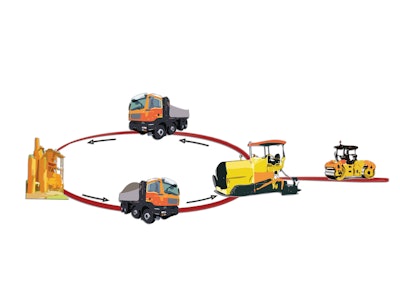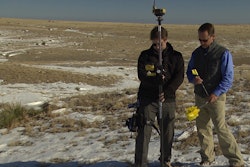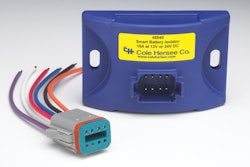
As few construction sites as possible, which are finished as quickly as possible – that's what everyone who uses the roads wants. Only if all operations at a construction site proceed without trouble can this be attained. Because if processes are reciprocally coordinated with precision, this enables the work to be completed more quickly and with optimum results. And, with optimum results, that means top-quality road surfaces that much less frequently require repair work. Thus, the number of construction sites is reduced – saving the money and time expended for premature improvement or repair work. This principle was tested by the EU-initiated project ASPHALT (Advanced Galileo Navigation System for Asphalt Fleet Machines) for satellite navigation and fleet management.
Within the scope of the ASPHALT research project, MOBA Mobile Automation AG – together with Fraunhofer IIS, DKE Aerospace, Dynapac, Teleconsult Austria and inPosition – developed a way of optimizing the process flows at the construction site using GNSS technology, from the paving of the asphalt to compaction, and at the same time networking the machines with one another. In doing so, the scalable, high-precision and cost-effective system interlinks the satellite-based positioning and the steering and control systems of the deployed machines. Initial field tests took place late 2011 on Germany's A111 highway outside of Berlin – ASPHALT impressed not only the machine operators but also construction companies and state, national and EU decision makers.
Trouble-free processes based on satellite positioning
The project results are groundbreaking. Because while GNSS technology is being applied with increasing frequency in the area of earthwork and for monitoring tasks, satellite-based position data has very seldom been used for asphalt work up to now.
ASPHALT utilizes this technology to position the machinery. Trucks, pavers and rollers deployed at the construction site were equipped with receivers specially developed for the project. Currently, these work with GPS signals and, once available, will work with Galileo. Furthermore, with RTK (Real Time Kinematik), the position signal can be improved right down to centimeter precision in order to fulfill asphalt construction requirements. By combining GNSS and inertial sensor technology, even short distances – under bridges, for example – can be circumvented without satellite reception.
"With the compiled data, the entire asphalting process can be optimized and the deployment of the machines reciprocally coordinated," explains project manager Marcus Watermann (MOBA Mobile Automation AG).
Networking of the machinery – for better road quality
The networking of the machinery is a very promising aspect for improving the quality in road construction, while at the same time saving time and money through quick completion of work at construction sites. In addition to the material properties, the quality of the pavement is also particularly dependent upon the material provision, the process handling during the asphalting and upon the controlling of the paver and the screed. The application and compacting temperature, and the compaction itself, are further parameters that are decisive for the properties of the road. With ASPHALT, material movements are monitored from the applying of the asphalt up to the paver. The system can be used to coordinate the transport of the asphalt to the construction site and make it easier for the driver to dock the truck to the paver. This way, no disruption of the flow of material can occur and the asphalt is applied in the optimum temperature range. Furthermore, with the MOBA-matic levelling system and Sonic-Ski, the layer of thickness is regulated in such a way that a smooth, even road surface is provided for and unevenness is prevented. During the asphalting, the temperature of the applied material is monitored by MOBA Pave-IR. This offers substantiating documentation that the material is being applied at the correct temperature. The MOBA MCA-2000 roller system supports roller drivers when compacting by measuring the asphalt temperature and monitoring the number of the repeated passes over the pavement. Incorrect compaction is prevented in this manner. Networking of the machines with their positional data ensures that the rollers compact the material at locations with the appropriate temperature range.
Potential savings combined with higher quality
With ASPHALT, time and money can be saved because a time buffer is no longer necessary, unnecessary transport trips are avoided and no redundant material is delivered or used. An additional bonus: All data can be automatically recorded and documented. ASPHALT also offers large potential for savings to communities, urban and rural areas: Thanks to the high quality of the roads, the maintenance costs sink, repairs become more seldom or are only necessary at greater time intervals. If the service life of roads is increased by just 10%, this already means an annual savings volume of €4.5 billion in Europe. This also means that fewer resources are consumed. The number of traffic jams on highways – 15% of which are caused by construction sites in Germany, thus making them the second most frequent cause of traffic jams (after traffic overload) – is reduced. CO2 emissions, and hence environmental pollution, are reduced as well. Since unevenness of the road surface – which causes aquaplaning – is prevented, road traffic safety is improved.



















